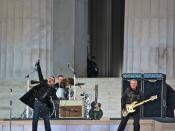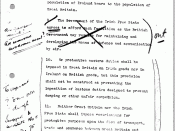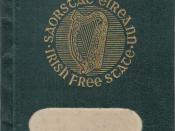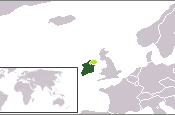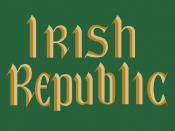The British Rule In Ireland Angry, enraged, and furious summarizes many Irish feelings toward rebellion for independence. In order to gain freedom from the British, revolutionaries were willing to sacrifice everything, even their lives. For centuries, the Irish had been part of the vast British Empire, and for most of that time, they struggled to obtain their independence. Numerous events sparked the dissatisfaction in Ireland in the early Twentieth century. One of the events is the Easter Rebellion, which some felt was the turning point for the war. Some of the Irish felt that World War I going on at the time had an influence on the Easter Rebellion. The treatment of the Irish by the British was the main reason for the rebellions and explains why the Irish wanted their independence.
At the top of the Irish list of grievances was how they were being treated. The Irish parliament was highly poor and had no real power to represent the people (The "Outlook"ÃÂ, 116).
Additionally, Britain governed Ireland in the same manner that it governed all of its territories; it ruled according to what would best serve Great Britain. For example, Ireland's commerce was discouraged, and their manufacturing was halted by the British rule over the Irish (The "Outlook"ÃÂ, 116). The Irish were forbidden to purchase or lease land (MacManus, 458). Also, religious treatment of Roman Catholics angered the Irish. A large number of Irish were Catholic and were repressed in many ways by English legislature. They were expected to pay taxes to support the Established Church of England, which gave Catholics no services (MacManus, 456). Furthermore, Irish Catholics were not able to provide education for their own children. Catholics were not permitted to be teachers, and parents could not send their children for education without forfeiture of their property and citizenship (MacManus, 459). These actions by the British government angered the Irish, and the new wave of rebellion had begun again with the British government fighting back.
Strong feelings came to a peak on Easter Monday, April 24, 1916 in the Irish capital of Dublin when approximately 1500 men, led by the Irish, seized the post office and other strategic points ("The Outlook"ÃÂ, 115). These men were members of the Citizen Army, an illegal force of Dublin citizens, which they established themselves in military fashion by setting up barricades of sandbags and closing off the streets with barbed wire. The leaders of the rebellion declared Ireland independent and raised the national flag above the city. These men signed a proclamation of independence, which declared Ireland independent from Britain. From the roofs and nearby houses, snipers shot any uniformed British soldier who came into sight. By April 25, 1916, the rebels controlled most of the city. The British quickly launched their counterattack when additional troops arrived in Dublin. Violent street fighting soon developed in the city, during which the British steadily removed the Irish from their positions. The Irish became no match for the British forces, and realizing they had no chance to win, the citizen army surrendered on April 29, 1916.
The Easter Rebellion had several effects on Irish politics and history. Civilians suffered severely in the short days of fighting; over 100 deaths were reported, including women and children (Ward, 204). The British lost approximately 440 troops and about 200 buildings were destroyed in Dublin ("Easter Rebellion"ÃÂ). The fifteen Irish men who led the rebellion and declared Ireland's independence were executed by a firing squad. Other participants in the rebellion were imprisoned for life (MacManus, 8). The Easter Rebellion also led to the increased power of the Senn Fein organization, which was an organization that promoted Celtic language and pushed for absolute independence of Ireland. Several leaders of the citizen army were members of the Senn Fein organization. This uprising was the first in a series of events that resulted with the establishment of the Irish Free State in 1921.
During World War I, which was occurring at the time of the Irish revolt, Germany's primary opponent was the British. The Germans believed that if Britain could be removed or even distracted from the war for a period of time, Germany would have a greater chance of victory. For this reason, many wonder how much of an influence the Germans were on the Irish to initiate a rebellion. It is certain that there was a connection between the two because of some of the weapons found on the Irish rebels were marked "Made in Germany." Additionally, an attempt was made a week prior to the outbreak in Dublin to land 15,000 rifles on the west coast of Ireland. The arms were aboard a German vessel disguised as a Dutch merchant ship, and were so skillfully hidden that the ship passed inspection of two British patrols on its way out of the North Sea (Ward, 203). Germany never acknowledged any assistance of the Irish rebels.
The reasons are obvious why the Irish were enraged with the British. They have been oppressed for the past three centuries and have been fighting for there independence. The Easter rebellion was just one example of many fights between the Irish and the British. This battle was the turning point in the Irish fight for freedom. It showed the British that they couldn't do whatever they want to the Irish. The Irish have suffered loss of life and property beyond anything that the British have. The Irish had a very understandable reason for wanting their independence from the British.
Works Cited "Easter Rebellion." Encyclopedia Encarta. 1993.
Hackett, Francis. "The Irish Revolt." The New Republic. Vol. 7. (May 13, 1916): 34-36.
"The Irish Revolt." The Outlook. Vol. 113 (May 17, 1916): 116-119.
Ward, William Hayes, ed. "The Irish Revolt." The Independent. Vol. 86 (May 8,1916): 202-204.
MacManus, Seumas. The Story of the Irish Race. N.Y: Devin-Adair, 1975. 454-469 Swift Jonathan, "A Modest Proposal."ÃÂ Literature, An Introduction to Literature, Poetry, and Drama, 5th Edition, 1994 Ed. X.J. Kennedy, 489-495.
